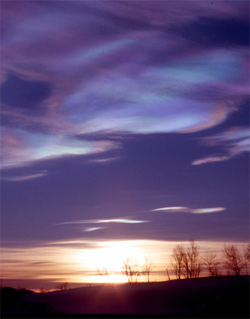Geoengineering solution to global warming could destroy the ozone layer
Geoengineering solution to global warming could destroy the ozone layer
mongabay.com
April 24, 2008
A proposed plan to fight global warming by injecting sulfate particles into Earth’s upper atmosphere could damage the ozone layer over the Arctic and Antarctic, report researchers writing in the journal Science. The ozone layer is important because it blocks dangerous ultraviolet radiation from the Sun.
Based on observations of the global temperature effects from aerosols released during volcanic eruptions, some scientists have proposed scattering light-reflecting sulfate particles in the atmosphere as a way to mitigate climate change. Paul J. Crutzen, winner of the 1995 Nobel Prize in Chemistry for his work on the hole in the ozone layer, has said that injecting sulfur into the atmosphere could slow global warming by reflecting solar radiation back into space.
Now a new study led by Simone Tilmes of the National Center for Atmospheric Research (NCAR) warns that regular injections of sulfates over the next few decades would destroy between one- and three-quarters of the ozone layer above the Arctic. Meanwhile in the Antarctic, the geoengineering scheme could delay the expected recovery of the current ozone hole by 30 to 70 years.

Polar stratospheric clouds are an alluring component of the high latitude sky. Reactions occurring on these cloud surfaces convert chlorine to a form highly reactive with ozone. A proposed geoengineering scheme to mitigate climate change involves the injection of prodigious amounts of sulfur into the stratosphere, resulting in aerosol surfaces that would greatly enhance future polar ozone depletion, researchers say. [Image courtesy of Ross J. Salawitch] |
“Our research indicates that trying to artificially cool off the planet could have perilous side effects,” Tilmes said. “While climate change is a major threat, more research is required before society attempts global geoengineering solutions.”
“Clearly much more research needs to be conducted to determine the full implications of geoengineering before we may seriously consider the injection of sulfate aerosols into the stratosphere,” said co-author Rolf Moeller of the Joelich Research Center in Germany.
The authors said that the loss of ozone could be even more severe if a major volcanic eruption occurred during the geoengineering scheme.
The research is not the first to warn of the potential adverse effects of geoengineering solutions to climate change. Last August a paper published in Geophysical Research Letters cautioned that sulfate injections could have “major adverse effects, including drought.” Similarly, Ken Caldeira of the Carnegie Institution’s Department of Global Ecology at Stanford University has shown that even if a “sun block” solution to solar radiation proved successful, it would not address acidification of the world’s oceans and other problems caused by higher carbon dioxide concentrations.
“Given current political and economic trends, it is easy to become pessimistic about the prospect that needed cuts in carbon dioxide emissions will come soon enough or be deep enough to avoid irreversibly damaging our climate,” Caldeira said in June 2007. “If we want to consider more dramatic options, such as deliberately altering the Earth’s climate, it’s important to understand how these strategies might play out.”
“The Sensitivity of Polar Ozone Depletion to Proposed Geo-Engineering Schemes,” by S. Tilmes at National Center for Atmospheric Research in Boulder, CO; R. Müller at Research Center Jülich in Jülich, Germany; R. Salawitch at University of Maryland in College Park, MD.
Related
Nuclear war could cause global cooling (i.e. block global warming) December 11, 2006
Nuclear war would disrupt global climate for at least a decade according to new research presented Dec. 11 at the annual meeting of American Geophysical Union in San Francisco. The research, based on findings from historic volcano eruptions, found that a small-scale, regional nuclear war could produce millions of tons of “soot” particles that could block solar radiation, in effect, cooling the planet.
Ozone ban has been more effective in fighting global warming than Kyoto Protocol March 5, 2007
The 1987 Montreal Protocol, which restricted the use of ozone-depleting substances, has helped slow the rate of global warming in addition to protecting the ozone layer, report scientists writing in a paper published online in the early edition of PNAS.














